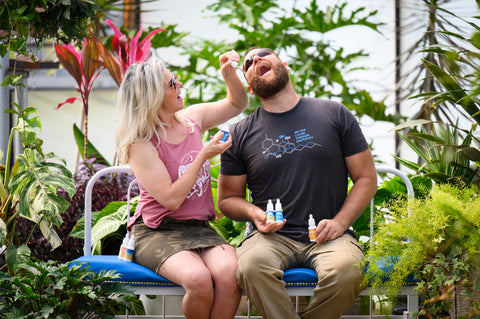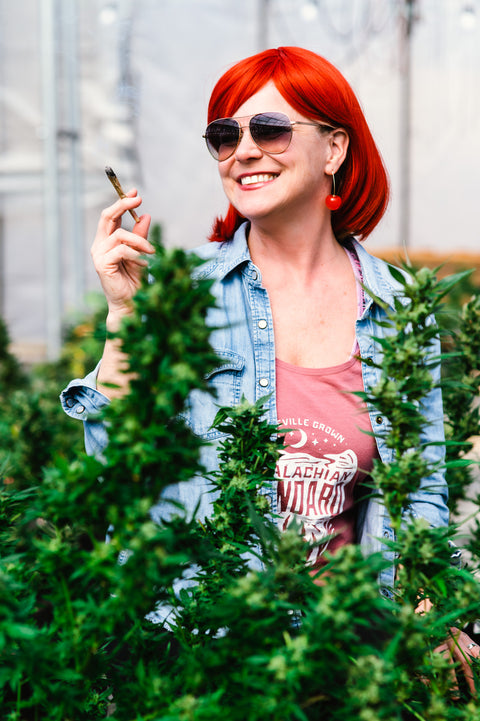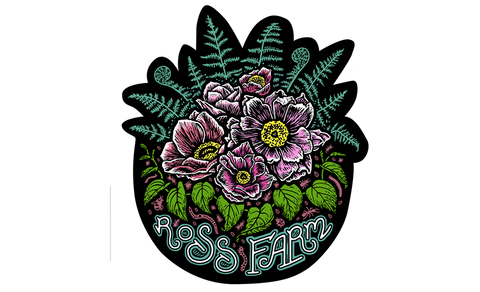GENERAL QUESTIONS & CBD BASICS
DO YOUR PRODUCTS CONTAIN THC?
All of our products are full spectrum, meaning there is a trace amount of Delta-9 THC (Below the federal limit of 0.3%) and all sorts of other amazing cannabinoids. All of our products are extensively tested by professionals. Here are some General Questions and CBD Basics.WHAT IS THE DIFFERENCE BETWEEN CBD HEMP AND “MARIJUANA”?
To start, the word marijuana is not an actual scientific term, but a slang term that refers to high-THC cannabis. The difference between our CBD hemp and “marijuana” is that the latter contains high amounts of Delta-9 THC. This is the molecule that makes people ‘stoned’ and modern cannabis has been selectively bred so that the plant produces high amounts of it. Hemp and “marijuana” are the same species of plant, but “marijuana” is hemp that contains high THC. THC is one of many Cannabinoids, as is CBD. Instead of selectively breeding plants that produce higher levels of THC, CBD hemp plants are selectively bred to produce high amounts of CBD instead. For example, a hypothetical high-THC cannabis strain might contain 15% THC and 0.2% CBD while our CBD hemp flower contains just the opposite. Ours have something like 15% CBD and less than .3% THC by weight (this is the federal limit).WILL CBD HEMP MAKE ME FEEL HIGH OR STONED?
CBD is not psychoactive, meaning that using CBD does not create a ‘high’ sensation like THC. Despite their similar chemical structures, CBD and THC don’t have the same psychoactive effects. The sensations that an individual experiences will vary from person to person depending on many different variables. Some of these include tolerance, frequency of use, the amount of product taken, etc. The effects of CBD are more subtle than THC and include feelings of relaxation, well-being, and calmness.WHAT DOES FULL SPECTRUM MEAN?
The term Full Spectrum relates to the hemp extract that is as close to the original plant as possible. These extracts contain dozens of cannabinoids and terpenes, not only CBD but CBG, THC, CBN, CBC, myrcene, pinene and many more organic compounds found naturally in the hemp plant. An assortment of cannabinoids and terpenes can contribute to the “entourage effect”. The "Entourage effect" is when various cannabinoids and terpenes can work synergistically to enhance the effects of each other.WHAT’S THE DIFFERENCE BETWEEN FULL SPECTRUM, BROAD SPECTRUM, AND ISOLATE?
Full Spectrum: We exclusively sell this type of CBD product. When a product is full spectrum, it means that the extracts or tinctures are not altered in any way, preserving the Full Spectrum of cannabinoids, terpenes, and flavonoids exactly as it occurs in the plant. This includes trace amounts of THC (below the federal limit of 0.3% by weight). Having an assortment of cannabinoids and terpenes can contribute to the “entourage effect” whereby various cannabinoids and terpenes can work synergistically to enhance the effects of each other. Broad Spectrum: A broad spectrum product is one that contains CBD as well as other plant compounds but does not contain any trace of THC. Isolate: CBD Isolate is CBD that has been extracted from the plant and then processed a variety of ways until what is left is pure, crystalline CBD with no other compounds from the plant. This is useful for those who are subject to THC drug testing but does not allow for the full entourage effect that is specific to Full Spectrum.IS IT POSSIBLE TO TAKE TOO MUCH CBD?
In terms of an ‘overdose’, no. In order for CBD to be toxic to your system, you would have to ingest almost 20,000 mg of CBD in a short amount of time. That would be the equivalent of eating 1333 Boujee Bears in one sitting!! If you are new to CBD and unsure how much to take, we recommend starting with a small dose, evaluating the effects, and increasing dosage from there as necessary. Typically a normal dose on the lower end is anywhere from 15-25mg of CBD. Often, people with more severe conditions may find that a higher dose of 50-100mg is needed for full relief. Again, if you are new to CBD we recommend working your way up to this level of dose if you feel it is necessary after taking a smaller amount. You may find that the lower end dose works well for your individual needs.WHAT IS A COA AND WHERE CAN I FIND THAT INFORMATION?
A Certificate of Analysis, or COA, is a document that establishes that a product was analytically tested by a licensed third-party lab and meets specifications of safety and quality. Results are issued in the form of a Certificate of Analysis for each individual product.IT SEEMS LIKE THE CBD PRODUCTS AREN’T WORKING?
An individual’s correct dosage of CBD depends on the severity of the symptom being treated. We can not diagnose or prescribe CBD for any medical reason and recommend reaching out to a trusted medical professional for all medical advice. For best results, CBD should be used on a regular basis to achieve full effect. We recommend starting with a small dose and adding more over time until you find the amount that works for you!CAN I USE CBD IN CONJUNCTION WITH OTHER MEDICATIONS?
You should always consult with a medical professional if you are already taking prescribed medications to make sure CBD will not have any adverse interactions.WHAT IS THE BEST METHOD OF TAKING CBD FOR ME?
Each method offers a different experience and we recommend trying different methods until you find what works best for your needs! See the questions below for a more detailed breakdown of each of our offerings.WHAT ARE TERPENES?
Terpenes are a major component of plant resins and the primary ingredient of a plant’s essential oil. A plant’s “terpene profile” determines much of its taste, smell, and effects. For example, the terpene Limonene gives the plant a citrus-y taste and aroma, and is found in actual citrus fruits as well. Pinene has a piney taste and is what gives pine trees their distinct smell. Myrcene is the most common terpene among hemp and cannabis plants and is also found in hops, thyme, and lemongrass. It has a peppery taste that some describe as spicy. The effects and interactions of these terpenes is an exciting area of cannabis/hemp research!WILL CBD INCREASE MY ANXIETY OR CREATE PARANOIA?
Because there is such a small amount of THC (Below the federally legal maximum of 0.3%) present in our full spectrum goodies, there is not a psychoactive high from using any of the hemp babes. The beauty of CBD is that studies have shown it to provide a sense of peace and well-being rather than worsening anxiety. Since everyone is unique, results and experiences may vary.WILL THIS APPEAR ON A DRUG TEST?
All our products are full spectrum, so they have less than the federally legal maximum of 0.3% Delta 9 THC. It’s a bit of a grey area if the cannabinoids will appear on a drug screening. It depends on quite a few variables like the sensitivity of the test, your metabolism, the rate at which you are using the products, etc. Appalachian Standard is not responsible for any failed drug test. We wish we could give you a more straightforward answer and unfortunately there are too many variables at play for us to make any guarantees.WILL CBD GIVE ME THE “MUNCHIES”?
The increase in appetite known colloquially as “the munchies” is specific to THC and is not a side effect of using CBD. The amounts of THC present in our products are not sufficient to induce this response. CBD-rich products may not directly give you the munchies, but can put you in a better mood. This can lead to enjoying yourself with a delicious and healthy meal. CBD doesn’t interact with the CB1 receptor the same way that THC does, so it may have an indirect impact on your appetite. For people who experience abdominal issues due to inflammation, CBD can assist with that to the point that it can prompt a return of appetite.
CAN I USE CBD PRODUCTS WHILE NURSING OR PREGNANT?
We strongly recommend consulting your physician on the use of CBD while pregnant or nursing. Research has focused primarily on THC as opposed to CBD. Some studies show that since CBD is fat-soluble it can be expelled through your breast milk.CAN PEOPLE UNDER 21 YEARS OF AGE USE CBD?
Hemp is still in its early stages of regulation. You may have noticed discrepancies between different companies. For example, some CBD hemp shops sell to customers aged 18+ while others are 21+. The reason we say our products are for those aged 21+ is to stay in line with cannabis legalization norms. We want to be prepared for the day when both CBD and THC cannabis are federally legal, and when that day comes it will be a controlled substance like alcohol. We want to continue growing our gorgeous ladies for as long as possible so we are committed to selling our hemp responsibly and ethically. If you would like to visit our farm in North Carolina, we can sell to 18 and up because that is allowed by this state.
CAN I GIVE CBD TO MY CHILD?
If you are thinking of giving CBD to your child, we strongly recommend checking with a trusted physician first. As a general rule, we only sell to customers aged 21 and up so we are not at liberty to make any recommendations for use by minors.
CAN ANIMALS USE CBD?
Is your animal friend feeling stressed during these tough times? Look no further! The long awaited Pet Formula Full Spectrum CBD Tincture has arrived! We want your fur-babies to feel the sweet relaxation and pain relief from our goodies, just like you do. This 15ml 250mg Greenhouse Blend Tincture can be mixed into their food, treats, or taken on its own. These natural babes contain only two essential ingredients, and nothing else!
- Full Spectrum Hemp Flower Extract
- Premium, Organic MCT Oil
HOW MUCH CBD DO I GIVE MY PET?
Although the weight of your dog doesn’t always correlate with how much CBD they need, it’s a good starting point. We generally recommend starting with a minimal dose of 1 mg of CBD per 10 pounds of body weight. It’s best to start small and work your way up as necessary to find the correct dosage for your pet. Please reach out to your veterinarian to ask about interactions with other medications.









Comments (0)
There are no comments for this article. Be the first one to leave a message!